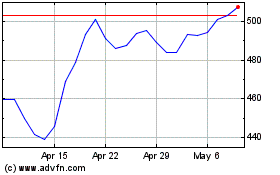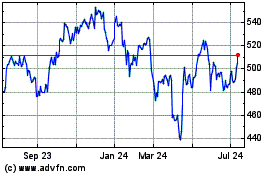Trump's Win Leaves Health Insurers With Questions
November 09 2016 - 9:34AM
Dow Jones News
By Anna Wilde Mathews
Few companies had more at stake in this election than health
insurers, which are at the center of the changes brought by the
Affordable Care Act.
Donald Trump's victory leaves the industry with a huge question
mark, which is likely to immediately weigh on shares of the
companies. Many analysts think it is unlikely all of the ACA's
effects would be truly undone, but the lack of clarity would likely
pressure the industry. "A Trump victory just increases uncertainty,
which the market doesn't like, " said Thomas Carroll, an analyst
with Stifel Financial Corp.
Indeed, on Wednesday morning, analysts warned of a plunge in
health-care stocks, including insurers but also among hospital
companies. The near-term "impact and shock of the result will weigh
on stocks across our coverage until we get greater clarity on
agenda and details" around Mr. Trump's health-care policies, wrote
Ralph Giacobbe, a Citi analyst. Writes analyst Ana Gupte of
Leerink, "The unthinkable has happened."
Though Mr. Trump has committed to repeal the health law, he has
been vague about how he would do so and what would replace it. Like
other Republicans, he has endorsed policy ideas including selling
health plans across state lines and increased use of health-savings
accounts.
In a statement, America's Health Insurance Plans, the main
lobbying group for the industry, said it would "work across the
aisle -- with every policy maker and the new administration -- to
find solutions that deliver affordable coverage and high-quality
care for everyone."
The insurance industry's experience with the ACA has been a
mixed bag, with upsides and downsides. If Mr. Trump somehow did
away with the law's expansion of Medicaid, insurers could lose new
enrollees they have gained and the prospect of further growth in
that business from states that hadn't yet expanded their programs.
A rollback of the Medicaid expansion would also be a blow to
hospitals that have benefited from having more paying
customers.
It isn't clear what would happen to the law's signature
marketplaces and the widespread changes the ACA brought to the
individual insurance business. Many insurers have lost money in the
exchanges, and some major national players have pulled back from
them for next year, including UnitedHealth Group Inc. and Aetna
Inc. Others that retain major exchange footprints, including Anthem
Inc., have said they need to see reforms to assure the marketplaces
are sustainable.
The danger for insurers would be if Mr. Trump and Republicans
retained some politically popular elements of the ACA, such as the
requirements that insurers sell insurance to consumers regardless
of their health conditions, while dumping those less appealing to
voters, such as the penalties for those who lack insurance. That
could accelerate the unraveling of the health marketplaces, though
the earnings impact on insurers that already have largely withdrawn
would obviously be limited.
Still, if Mr. Trump chooses to take a pragmatic stance, leaving
parts of the ACA in place while easing some of its rules, the
industry could benefit, said Chris Rigg, an analyst with
Susquehanna Financial Group. "The political reality is much more
nuanced than the market might initially think," he said. Analysts
point to Republicans' traditional support for private companies'
role in government health programs, particularly Medicare, as a
possible silver lining for insurers.
Write to Anna Wilde Mathews at anna.mathews@wsj.com
(END) Dow Jones Newswires
November 09, 2016 09:19 ET (14:19 GMT)
Copyright (c) 2016 Dow Jones & Company, Inc.
UnitedHealth (NYSE:UNH)
Historical Stock Chart
From Mar 2024 to Apr 2024

UnitedHealth (NYSE:UNH)
Historical Stock Chart
From Apr 2023 to Apr 2024
